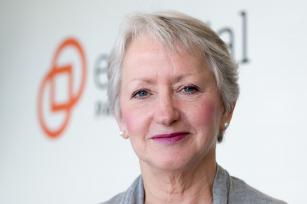
Breadcrumb
- Essential Partners
- Our Impact
- News and Notes
- Difference, Conflict & Love: 3 Steps to Improved Communication Skills
Difference, Conflict & Love: 3 Steps to Improved Communication Skills
Family: the original gift, like it or not. My sister and I named our family the “news, sports, and weather family,” because we had perfected the art of not talking about emotions, differences, or contentious topics. We replaced open dialogue with silence, daily activity reports, getting things done, or worse yet, arguing.
We were an intelligent, talented, hard-working family with parents from different cultures and dramatically different points of view. Self-understanding, presence and conversation skills would have made for more joy a lot earlier than we finally found it.
Even as a teen I wondered, How can we have conversations that are more curious and less instructive, more appreciative and less judgmental, more flexible and less fearful? How can we let our guard down, name what is happening and find solutions that are satisfying for all of us?
What our family lacked in conversation skills we made up for in hard work, done well. It was our way of demonstrating love—and it worked, though what I most wanted was both conversation and action, the full complement of well developed skills that could make a rich life at home, at work and in our community.
This was my family’s original gift, a life experience that helped me notice what I had, what I longed for, and what I wanted to develop in my own life. Only now, years later, can I see how our family dynamics illuminated the path, however winding and circuitous, back to myself. That’s my path. Here’s my strategy.
No matter what your personal or professional goals, these steps will help you.
Step 1: Build Emotional Sturdiness
Stretch your comfort zone. Break old patterns. Say "yes" to opportunities. Learn new things.
Build trust in yourself as you strengthen your emotional capacity to listen, speak, create, succeed, fail, give, receive, lead. There will be moments of awkwardness, but you’ll survive them and, with humility and good-heartedness, they can even be endearing. You’ll likely wish for a few “do-overs,” too, but you will grow.
Step one: live your life beyond what you already know.
Step 2: Commit to Understanding Yourself & Others
Ask yourself, why do I do what I do? What motivates each of us to be so different in how we communicate, lead and interact in relationships? What are my gifts and challenges? How can I be more accepting of myself and others? How might acceptance, appreciation and knowing more about how to meet people where they are impact our relationships at home and at work? Would we be happier and more productive?
One of my favorite resources is the Enneagram, a framework of categorizing the way people tend to interpret the world and how they often manage their emotions. It has helped me be more compassionate, to appreciate differences, and to relate more effectively.
Step two: know thyself. Appreciate differences. Diversify your own tools. Respond, don't react.
Step 3: Develop Your Communication Skills
I wanted tools I could use, and that’s how I found Essential Partners. EP helps expand your communication toolkit so you can elegantly and effectively get beyond beyond news, sports, weather. I have learned how to listen well and ask genuine questions, to have a conversation that’s rich with curiosity and connection, to unlock stuck conversations through mutual understanding, to feel more grounded in my own voice, to communicate across different cultures, personalities, and contexts, and develop everyday tools to resolve or transform conflict. Step three: expand your quality communication skills. Practice every day.
So here’s the sweet ending to my family story. I flew home early one Saturday morning to visit my parents. I was departing the next evening. It was a short visit so I decided to simply ‘be with’ them. Just do what they do. No plans. No squeezing in hurried visits to old pals. Mom spoke from her heart about things important to her. Dad was his usual not too talkative self.
Sunday morning while I was in the kitchen he spread his arms across the doorway and gruffly said, "Have you been here for even 24 hours yet?" I have been known to rise to his bait, do some destructive inner self-talk, or push back. (Remember, I said, practice every day). But this time, feeling relaxed and happy, I had a sense of humor, looked at my watch, smiled straight from my heart and said, "Yes, actually, I have.”
All of the sudden, Dad's faux gruff curmudgeonly expression softened and a huge smile spread across his face, as he said, "And look how much joy you've brought in such a short time!" My heart nearly pounded out of my chest that morning. I'll never forget his words, and that we arrived there simply by my choosing to 'be present.’ My father died suddenly several months later. I never saw him again after that moment of joy in the doorway. Thank heaven we chose as we did. It was joy enough to last a lifetime and beyond.
